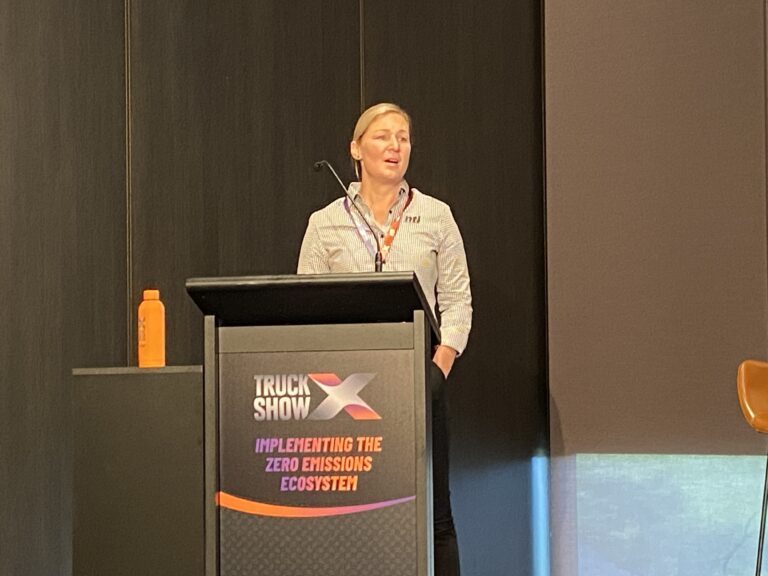There’s many reasons why insurance premiums may increase for a fleet, but according to Alisha Hill, National Product Manager – Heavy Package at NTI, an electric powertrain isn’t one of them.
Hill was speaking at the very first TruckShowX which brought the heavy vehicle industry and electric charging ecosystem together for the first time. NTI were a sponsor of the event, and were keen to make sure insurance isn’t a barrier to transport decarbonisation.
Addressing the three most common questions asked by NTI customers when considering the purchase of electric trucks, Hill also dispelled the notion that electric vehicles (cars or trucks) will cost more to insure because they have batteries.
“The most common question we always get asked is about premium. Will my insurance premium be more expensive with a low emissions truck?” explained Hill. “The really simple answer is probably yes. The premium is going to be more expensive on a low emissions truck but we want to stress that that’s not because of the fuel type.”
“It’s specifically because the value of these vehicles at the moment is more than your regular diesel truck. So probably the largest rating factor for premium when we’re calculating it is actually the value of the asset. So while that value is much higher than a diesel truck, the premium is just going to be more expensive organically. Again, nothing to do with the fact that it’s a low emissions truck. It’s purely just because the value is higher.”
According to Hill there at least 15 areas that have an impact on the cost of the insurance premium and at this point in time, fuel type is not one of them. It’s the things you would expect like claims history, the type of load in the truck, and the distance being travelled (i.e. local, regional or interstate).
The second most common question relates to repair times. NTI understand the impact of downtime and have developed a premium repair network which gets trucks back on the road quickly.
Low emission vehicles present a new challenge for repairers. NTI started working with their repair network and OEMs about eight years ago to make sure they are prepare for the changes.
“We’ve already established some really great relationships with a couple of the low emissions and ZEV truck OEMs. We’ve got Hyundai electric, SEA Electric, Foton Mobility, and we’ve got a really great premium repair network that’s been through training and education. And as much as we can support them when we get a low missions truck come in for repairs, we’re going to be able to do the right thing.”
Coincidentally, NTI had a Foton Mobility electric truck in their repair network the same week as TruckShowX. They were working closely with Foton to ensure the OEM processes and procedures were followed so truck goes back on the road as good as new.
Hill also touched on sustainability and efforts to always repair first. However, there’s always going to be a time when the value to repair the truck is more than the value of the truck. This applies to existing diesel powered vehicles and NTI is working with the industry to develop processes and standards to ensure components are reused, or recycled, in a sustainable way.
The third most common question relates to charging infrastructure and potential fire risks. Transport operators are concerned they’ll be charged more because they’ve seen videos of electric buses exploding while being charged.
Hill shared that on her visit to the Everything Electric show earlier in the year she learned that there’s a greater risk of an electric scooter causing a depot to burn down than a battery electric vehicle starting the fire.
“So the simple answer is no, we’re not worried about that,” stated Hill. “We don’t think that there’s any reason why that should be a concern for us.”
“We do have risk managers that will actually go out into the depot and have a look around. The reason that we do that is because the more that we understand the risk, the better that we can condition it, and price it; and make it correct for our insurance.”
“Are we going to ask you to park your vehicles four meters apart? Well, if you have the space Absolutely. We want you to park your vehicles four meters apart. But if you don’t have the space, we’re not going to ask you to do that. It’s all about being reasonable in this circumstance.”
“And this is not different for our fleet of low emissions trucks. This is just what we would do in a normal diesel fleet of trucks as well.”
“So I guess the message here is we want to understand, but we don’t think there’s a higher risk so we’re not going to put a barrier up we’re not going to condition differently.”






